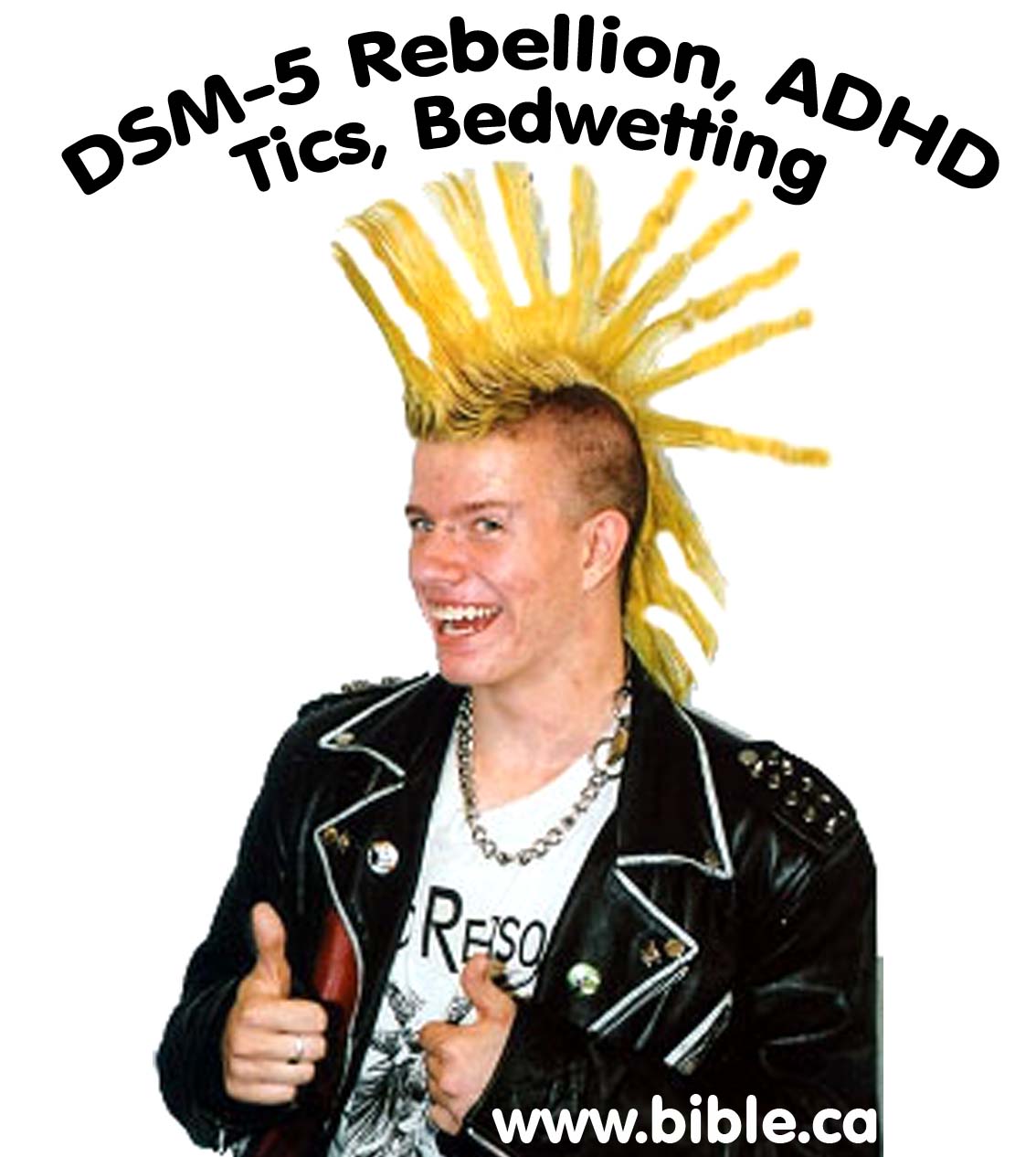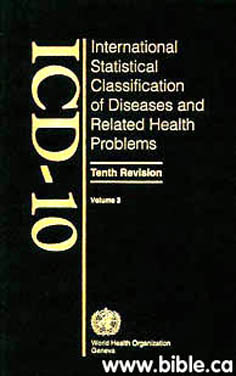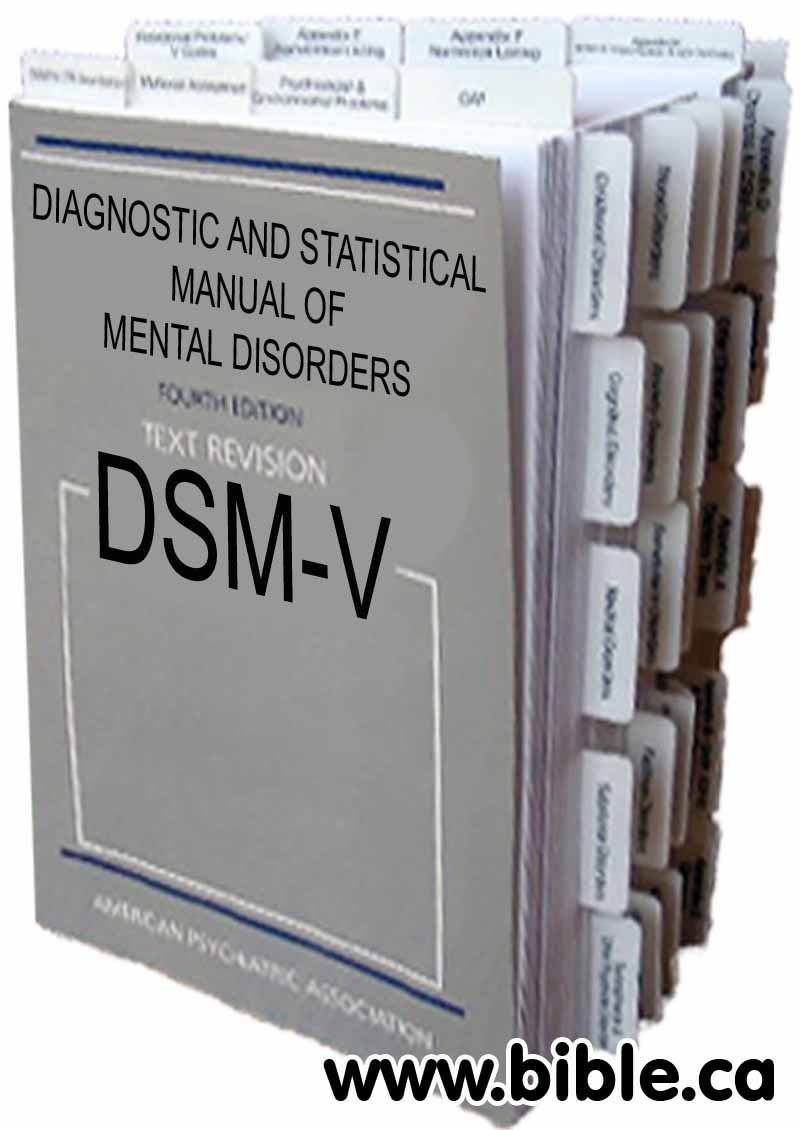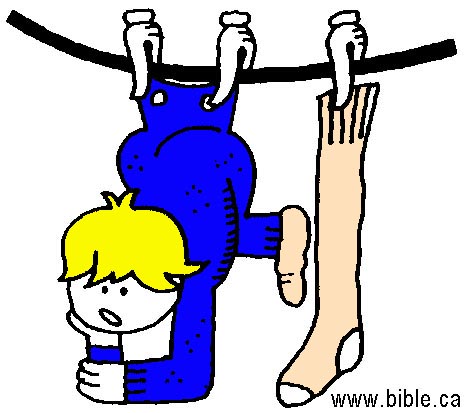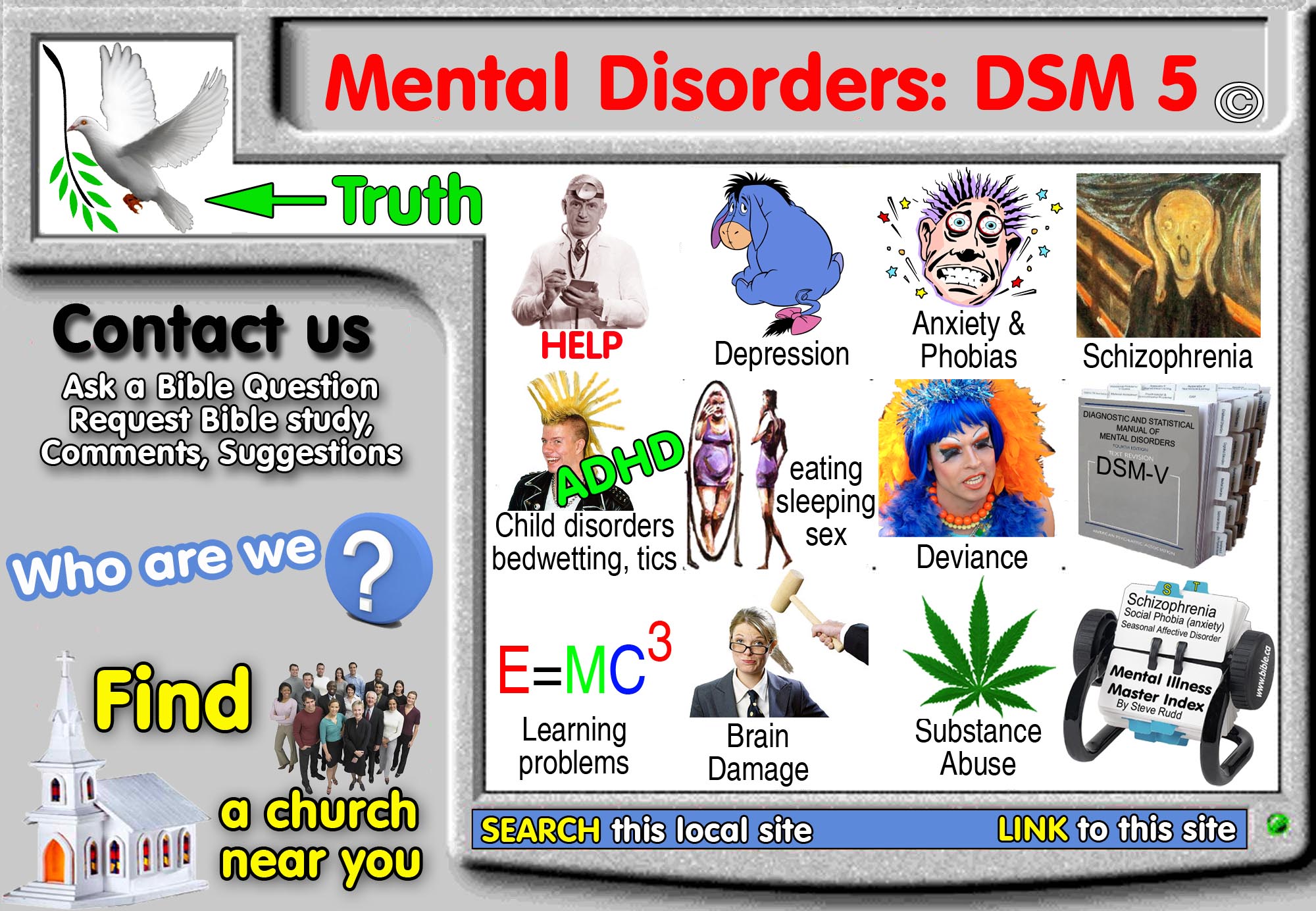DSM-IV, DSM-5, ICD-10: Childhood disorders: Attention deficit-hyperactivity disorder (ADHD) Bedwetting, Tics, Tourette's, Rebellion
There are no bad kids, only bad parents: “Foolishness is bound up in the heart of a child; The rod of discipline will remove it far from him.” (Proverbs 22:15)
|
|
|||
|
Childhood disorders: Attention deficit-hyperactivity disorder (ADHD) Bedwetting, Tics, Tourette's, Rebellion F90-F98 Behavioral and emotional disorders with onset usually occurring in childhood and adolescence There are no bad kids, only bad parents. (Proverbs 22:15) |
|||
|
|
|||
|
DSM-IV, DSM-5, ICD-10 International Classifications of Diseases Diagnostic and Statistical Manual |
|||
Introduction:
1. Typical of the topic mush of the DSM, we have a "catch all" category just for children that included anxiety, depression, Attention deficit-hyperactivity disorder (ADHD), Bedwetting, Tics, Tourette's, Rebellion.
2. There are no bad kids, only bad parents: “Foolishness is bound up in the heart of a child; The rod of discipline will remove it far from him.” (Proverbs 22:15)
|
|
|
|
The 10 minute Video Challenge |
|
|
Mental illness is behaviour and not disease. Ritalin is poison not medication. (ADHD) (4 minutes) |
The DSM-5 is the Atheist's Moral Code, the psychiatrist's Bible. (6 minutes) |
|
|
|
A. Childhood and adolescent Disorders usually evaporate as teens.
|
|
Normal Children do this:
Drugging children is child abuse. |
|
B. Bedwetting Bedwetting is caused by deep sleep patterns. |
|
- Bedwetting is caused by the child going into a very deep sleeping pattern. The only solution is for the parents to say nothing, keep a stock of clean bed wetting pads in the child's room and wait for them to outgrow it by age 12.
- "Pacific International, Ltd." in the USA and In Canada "Pacific Enuresis Programs Inc." are a company that is an example of junk science. Your kid sleeps on a water sensor and when he wets his bed this 100 db (very loud) bell rings beside the bed. This brings the child from a deep sleep into a panic of horror and fright. They offer a money back guarantee, but of course, that's only if you keep with the program for 5 years. So forget about getting the $1500 back they promised would stop your child from bedwetting after enduring this evil system of torture. It is just as much torture for the parents as it is the children. It wakes everyone up in the house! Parents often wet their own bed from fright when the bell goes off! After 3-5 years the percentage of children that stop bedwetting is no higher with this program, than if you had just saved your money and quietly endured by changing the bedding every morning.
- This program creates more psychological damage to the child by the way it wakes them up every night. They wake up screaming in horror! Sure they wake up after they start wetting, but you still have to change the bed sheets every morning just the same. The program is about as effective as throwing a large bucket of ice water on anyone sleeping. Forget these types of programs.
- These companies are vultures offering false hope to desperate parents based upon junk psychiatric science. When this program fails, you have made their bedwetting the central focus of their life and they really feel bad and like a failure. Furthermore, sleep is important. If the child needs this kind of deep sleep, don't mess with it. Why change the way they sleep! You might fix the bed wetting, but permanently break their healthy sleeping habits.
- One family reports that after 3 years, they quit the program. The child finally stopped wetting his bed 5 years later at age 12... the same age his grandfather stopped wetting the bed. Our advice is for parents to calm down and endure it. Don't make a big deal out of it. Nothing you can do will make any difference. The child will stop bedwetting usually by age 12.
C. Nail biting, thumb sucking, nose picking.
- If your child had a bad habit of opening the cabinet and drinking poison, you would not take them to a psychiatrist! Instead you would give them a swift smack on the behind and sternly tell them NO!
- If a child keeps picking up matches and starting fires in his room (a rather bad habit), you would not take them to a psychiatrist! A good spanking will get the message across and almost always fixes the problem!
- I remember a nice girl in grade 3 who made a display of "picking her nose in front of others and eating it". Another boy would pass gas into a bottle and open the lid later at recess in front of others. Someone just needed to sit these two children down and tell them: "Look, this must stop! You are going to make everyone hate you. No one will want to play with you. This is weird, it is rude! Everyone makes fun of you behind your back because you do this. They don't want to be your friend because of this. They are laughing at you!". The social stigma followed them through high school!
- If your child is nail biting, thumb sucking or "picking your nose in front of others and eating it", we believe a spanking would be the wrong thing to do. However "nose picking" and nail biting are not mental disorders that need a psychiatrist and drugs to fix a chemical imbalance.
- All bad habits that are within the control of the child can be fixed by giving negative reinforcement. Helping the child see how nervous habits like blinking a lot or Tourette's can negatively affect them in their social circle early on is the thing to do.
D. Attention Deficit/Hyperactivity disorder (ADHD):
|
|
|
|
Drugging
children is child abuse See our main page on Attention-Deficit (ADHD) |
|
|
|
|
1. ADHD, Autism, Aspergers have so many similarities that the same child can be diagnosed differently depending screening tool the doctor uses. They always treat these "disorders" with the same drugs: Ritalin!
3. ADHD, Autism, Aspergers are behaviour choices not diseases.
4. See our main page on Attention-Deficit (ADHD)
E. Cases of Childhood disorders:
|
Attention-Deficit (ADHD) |
|
|
Eating disorders: Anorexia, bulimia |
|
|
Panic Disorder (PD) |
|
|
Social Phobia (SP) |
|
Conclusion:
1. Childhood disorders fall into three categories:
a. Sinful behaviours caused by parental failure.
b. Unwanted behaviours they will naturally mature out of.
c. Normal behaviours that public school teachers label as mental illness and call for drugging.
2. Any psychiatric drug given to a child for any reason is child abuse. Drug the parents or teachers and leave the kids alone.
3. There are no bad kids, only bad parents.
4. “Foolishness is bound up in the heart of a child. The rod of discipline will remove it far from him.” (Proverbs 22:15)
|
DSM-IV, DSM-5, ICD-10: Substance Abuse: Alcohol and drugs |
F90-F98 Behavioral and emotional disorders with onset usually occurring in childhood and adolescence
F90 Hyperkinetic disorders (Attention deficit-hyperactivity disorder, ADHD)
F90.0 Disturbance of activity and attention
F90.1 Hyperkinetic conduct disorder
F90.8 Other hyperkinetic disorders
F90.9 Hyperkinetic disorder, unspecified
F91 Conduct disorders (rebellion, selfishness, lack of discipline)
F91.0 Conduct disorder confined to the family context
F91.1 Unsocialized conduct disorder (rebellion, selfishness towards those who are not your friends)
F91.2 Socialized conduct disorder (rebellion, selfishness towards your friends)
F91.3 Oppositional defiant disorder (rebellion, selfishness)
F91.8 Other conduct disorders
F91.9 Conduct disorder, unspecified
F92 Mixed disorders of conduct and emotions
F92.0 Depressive conduct disorder
F92.8 Other mixed disorders of conduct and emotions
F92.9 Mixed disorder of conduct and emotions, unspecified
F93 Emotional disorders with onset specific to childhood
F93.0 Separation anxiety disorder of childhood (similar to F94.2)
F93.1 Phobic anxiety disorder of childhood
F93.2 Social anxiety disorder of childhood
F93.3 Sibling rivalry disorder
F93.8 Other childhood emotional disorders
F93.9 Childhood emotional disorder, unspecified
F94 Disorders of social functioning with onset specific to childhood and adolescence
F94.0 Elective mutism (mute only in public places)
F94.1 Reactive attachment disorder of childhood (unable to form natural bonds with parents)
F94.2 Disinhibited attachment disorder of childhood (unable to be physically separated from parents, similar to F93.0)
F94.8 Other childhood disorders of social functioning
F94.9 Childhood disorder of social functioning, unspecified
F95 Tic disorders
F95.0 Transient tic disorder
F95.1 Chronic motor or vocal tic disorder
F95.2 Combined vocal and multiple motor tic disorder [Tourette's Syndrome]
F95.8 Other tic disorders
F95.9 Tic disorder, unspecified
F98 Other behavioral and emotional disorders with onset usually occurring in childhood and adolescence
F98.0 Nonorganic enuresis (Bed wetting)
F98.1 Nonorganic encopresis (toilet training)
F98.2 Feeding disorder of infancy and childhood
F98.3 Pica of infancy and childhood (dirt eating)
F98.4 Stereotyped movement disorders (nail biting, thumb sucking, nose picking, body rocking, teeth grinding)
F98.5 Stuttering [stammering]
F98.6 Cluttering (mumbled speech)
F98.8 Other specified behavioral and emotional disorders with onset usually occurring in childhood and adolescence
F98.9 Unspecified behavioral and emotional disorders with onset usually occurring in childhood and adolescence
By Steve Rudd: Contact the author for comments, input or corrections.
Send us your story about your experience with modern Psychiatry
